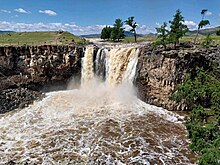Orkhon River
This article needs additional citations for verification. (January 2020) |
| Orkhon River Orkhon Gol | |
|---|---|
 | |
 | |
| Native name | Орхон гол (Mongolian) |
| Location | |
| Country | Mongolia |
| Aimags | Övörkhangai, Arkhangai, Bulgan, Darkhan-Uul, Selenge |
| Major cities | Kharkhorin (Karakorum), Sükhbaatar |
| Physical characteristics | |
| Source | Suvraga Khairkhan |
| • location | Tsenkher sum, Arkhangai |
| • coordinates | 47°2′59″N 101°20′30″E / 47.04972°N 101.34167°E |
| Mouth | Selenga |
• location | Sükhbaatar city, Selenge aimag |
• coordinates | 50°15′0″N 106°8′20″E / 50.25000°N 106.13889°E |
| Length | 1,124 km (698 mi) |
| Basin size | 132,835 km2 (51,288 sq mi) |
| Discharge | |
| • location | Bulgan |
| • average | 66 m3/s (2,300 cu ft/s) |
| • minimum | 0.5 m3/s (18 cu ft/s)February |
| • maximum | 190.2 m3/s (6,720 cu ft/s)July |
| Basin features | |
| Progression | Selenga→ Lake Baikal→ Angara→ Yenisey→ Kara Sea |
| Tributaries | |
| • left | Tamir River |
| • right | Tuul River, Kharaa River |


The Orkhon River (/ˈɔːrkɒn/;[1] Mongolian: Орхон гол [ˈɔrχɞɴ‿ɢɜɮ])[a] is the longest river in Mongolia.
The Orkhon river derives its name from the Old Turkic prefix "or" meaning "middle", and "khan" or king.
It rises in the Khangai Mountains in the Tsenkher sum of Arkhangai aimag at the foot of the Suvraga Khairkhan mountain.[3] From there, it crosses the border into Övörkhangai aimag and follows the upper Orkhon valley in an eastern direction until it reaches Kharkhorin. On this stretch, very close to the Orkhon, the Ulaan Tsutgalan river features a waterfall, ten metres (33 ft) wide and twenty metres (66 ft) high,[4] which is a popular destination for tourists.
From Kharkhorin it flows northwards until it reaches Bulgan aimag, and then north-east to join the Selenge River next to Sükhbaatar city in Selenge aimag, close to the Russian border.[5] The Selenge then flows further north into Russia and Lake Baikal.
With 1,124 km (698 mi), the Orkhon is longer than the Selenge, making it the longest river in Mongolia. Major tributaries of the Orkhon river are the Tuul River and Tamir River.
There are two sets of ancient ruins along the river valley: Khar Balgas, the ancient capital of the Uyghur Kingdom and Karakorum, the ancient capital of the Mongol Empire. Pyotr Kuzmich Kozlov excavated several Xiongnu Imperial tombs in the area of the river valley.
Fish in the Orkhon River include pike, carp, perch, taimen and catfish.
UNESCO lists the Orkhon Valley as a World Heritage Site.
See also
[edit]- Khöshöö Tsaidam Monuments (World heritage site)
- List of rivers of Mongolia
Notes
[edit]- ^ Old Chinese: 安侯水 (*arhoushui)^ [2]
References
[edit]- ^ "Orkhon". Dictionary.com Unabridged (Online). n.d. Retrieved 10 January 2020.
- ^ Onat, Ayşe; Orsoy, Sema; Ercilasun, Konuralp (2020). Han Hanedanı Tarihi Hsiung-Nu (Hun) Monografisi (in Turkish). Ankara: Türk Tarih Kurumu. p. 135. ISBN 978-975-16-1707-1.
- ^ "Russian army map "100k--l47-035"". Maps for the world. Retrieved 2015-01-05.
- ^ [WATERFALL ULAAN TSUTGALAN https://mongolia-guide.com/place/waterfall-ulaan-tsutgalan]
- ^ "Russian army map "100k--m48-069"". Maps for the world. Retrieved 2015-01-05.
Further reading
[edit]- H. Barthel, Mongolei-Land zwischen Taiga und Wüste, Gotha 1990, p. 34f
